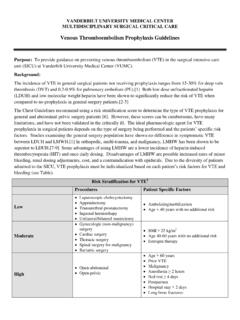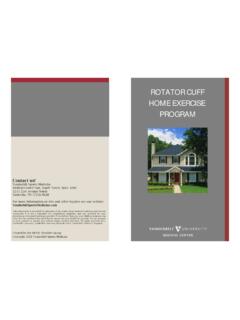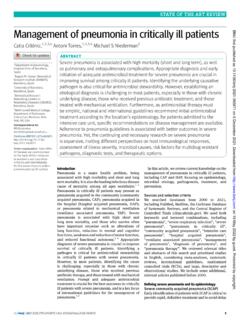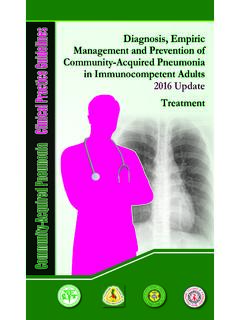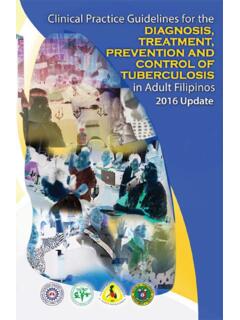Transcription of Clinical Recommendations for Evaluation and Management …
1 Clinical Recommendations for Evaluation and Management of COVID-19 Adult Patients Written by: VUMC Faculty in Anesthesiology, Cardiology, Emergency Medicine, Hematology, Hospital Medicine, infectious Diseases, Internal Medicine, Pharmacy, Pulmonary/Critical Care, & Radiology Approved by: VUMC Adult Clinical Practice Committee Date: May 27, 2022 Contents Inpatient Care .. 2 1. General guidelines for Admitted Patients with Symptomatic Acute COVID-19 Infection .. 2 2. Recommendations for Remdesivir in Symptomatic Hospitalized COVID-19 Patients .. 3 3. Recommendations for Corticosteroids in Hospitalized COVID-19 Patients .. 4 4. Recommendations for Baricitinib in Hospitalized COVID-19 Patients .. 5 5. Recommendations for Tocilizumab in Hospitalized COVID-19 Patients.
2 6 6. Recommendations for Monoclonal Antibody Treatment in Hospitalized COVID-19 Patients .. 7 7. Recommendations for Antibiotics in Hospitalized COVID-19 Patients .. 7 8. Recommendations for VTE Prophylaxis in Hospitalized COVID-19 Patients .. 7 9. Recommendations for VTE Treatment in Hospitalized COVID-19 Patients .. 9 10. Repeat COVID-19 PCR Testing in Symptomatic Inpatients .. 9 11. Guidance on Management of Suspected Multisystem Inflammatory Syndrome in Adults (MIS-A) Following COVID-19 .. 9 12. Recommendations for Transfer or Discharge of Patients with COVID-19 .. 10 Outpatient Care .. 12 13. General Recommendations for Care and Follow-up of COVID-19 Positive Outpatients Who Have Not Been Hospitalized for COVID-19 .. 12 14. Recommendations for Outpatient Antivirals for COVID-19 Treatment.
3 14 15. Recommendations for Monoclonal Antibody Treatment in Outpatients with COVID-19 .. 18 16. Recommendations for Evusheld (tixagevimab co-packaged with cilgavimab) for COVID-19 Pre-exposure Prophylaxis .. 20 17. Repeat COVID-19 PCR Testing in Symptomatic Outpatients .. 23 18. Adult Post-Acute COVID-19 Clinic .. 23 19. Guidance for Clearance of Suspected and Confirmed COVID-19 Patients .. 24 20. Guidance for Preprocedural/Presurgical COVID-19 PCR Testing .. 24 21. guidelines for COVID-19 PCR Testing in Asymptomatic Patients .. 24 22. guidelines for COVID-19 IgG Serology Testing .. 24 23. Recommendations for Other Medications Previously Proposed for Treatment of COVID-19 24 24. Postmortem 25 25. COVID-19 Vaccine Considerations .. 25 Summary This document highlights key updates to VUMC s COVID-19 Evaluation and Management guidelines as of May 27, 2022.
4 Updates to previously released guidance appear in red below. Please consult the VUMC Coronavirus (COVID-19) Information website for additional information. This document was developed after review of organizational guidelines [ , National Institutes of Health (NIH), infectious Diseases society of america (IDSA)] and peer-reviewed literature. Group consensus from a multidisciplinary group of experts was obtained, and the Adult Clinical Practice Committee has reviewed and approved prior to dissemination. Inpatient Care 1. General guidelines for Admitted Patients with Symptomatic Acute COVID-19 Infection Admission criteria for COVID-19 are identical to those for other viral pneumonias ( , influenza). Patients who are diagnosed with COVID-19 based on screening for other purposes ( , admission, pre-surgical screening) may not require further Evaluation .
5 Additional diagnostic testing should be based on the medical provider s assessment and discretion. Testing for patients to be admitted for suspected or confirmed COVID-19: o All patients with symptomatic suspected or confirmed COVID-19 should receive the following diagnostic testing: CBC with differential, CMP, respiratory pathogen panel (RPP)*, and Chest X-ray. *Note that RPP testing cannot be added on to a swab already in the lab. If RPP testing is needed, it should be ordered at the same time as the SARS-CoV-2 PCR. If RPP testing is needed after the SARS-CoV-2 PCR is resulted, then a new sample must be sent to the lab. o For patients with confirmed COVID-19, obtain baseline D-dimer quant, ferritin level, CRP, ESR, PT/INR, PTT, and procalcitonin testing for Management and prognostic indications.
6 Note that elevated D-dimer is a poor prognostic indicator for COVID-19 but alone does not indicate need for DVT/PE Evaluation . Troponin and BNP should not be routinely measured in the absence of other evidence of MI or CHF. o Daily laboratory testing is NOT recommended for patients who are clinically improving or in patients where testing is not expected to change Management . o For efficiency in patient care and for mitigation of potential exposure to patients and staff, portable AP Chest X-rays are preferred. o Chest CT is NOT recommended in COVID-19 screening and initial diagnosis. There is no indication for Chest CT in symptomatic COVID-19 patients who are well enough to be sent home from the ED or outpatient setting. Chest CT may be helpful in assessing suspected complications of hospitalized COVID-19 inpatients, including abscess or empyema.
7 Chest PE studies should be limited to symptomatic COVID-19 patients with sudden or rapid worsening of hypoxia or new onset chest pain that is not cardiac in origin. Telemetry is not routinely indicated in COVID-19 patients unless the patient meets other criteria. Restrictive fluid Management is recommended to avoid pulmonary edema. Order strict intake and output on admission. Attempt to keep an even fluid balance. Antibiotics for pneumonia ( , ceftriaxone and azithromycin or levofloxacin) may be considered in suspect COVID-19 patients with chest imaging consistent with pneumonia pending results of COVID-19 testing and RPP. A COVID-19 Accordion Report is available in eStar to assist with patient care. The report includes common labs, administered antibiotics/antivirals/corticosteroids, and links to chest imaging and culture reports.
8 The COVID-19 Accordion Report is available from the Patient List or from the Summary tab within a patient's eStar chart. Decision to transfer to higher level of care (ICU) should be made using current level-of-care standard operating procedures (SOPs) in conjunction with either an ICU provider and/or rapid response team. Patients requiring 80% FiO2 via Optiflow for 72 hours in the ICU may be considered for stepdown transfer. Discharge criteria for COVID-19 are similar to those for other viral pneumonias, and a patient does not have to be afebrile at the time of discharge. o Patients who test positive for COVID-19 and are being discharged after hospitalization for COVID-19 infection should self-isolate x 20 days after the test was obtained AND until improving and fever-free x 24 hours.
9 This is recommended even if patients have been previously vaccinated. o For patients who require SNF placement at discharge, discuss individual needs and discharge requirements with VUMC case Management . 2. Recommendations for Remdesivir in Symptomatic Hospitalized COVID-19 Patients For hospitalized patients, remdesivir may be considered, as approved by the Food and Drug Administration (FDA). Based on the NIH COVID-19 Treatment guidelines , patients being considered for remdesivir at VUMC should meet all the following criteria: Hospitalized with confirmed positive SARS-CoV-2 PCR 7 days since onset of symptoms Absence of all the following: Known hypersensitivity to remdesivir ALT > 10 times the upper limit of normal NOTE: Remdesivir is not recommended in patients with eGFR <30 ml/min per the FDA package insert.
10 After review of the available data and consultation with nephrology at VUMC, we allow use of remdesivir in patients with eGFR <30 ml/min at the discretion of the treating clinicians Requires Optiflow, non-invasive ventilation, mechanical ventilation, or ECMO o Dose: For patients who require supplemental oxygen but do not require Optiflow, non-invasive ventilation, mechanical ventilation, or ECMO: Loading dose 200 mg IV x 1 then 100 mg IV q24h x 4 days (for a total of 5 days of therapy) o NOTE: Patients who are ready for discharge should not remain hospitalized solely to complete the full course of remdesivir. o NOTE: Remdesivir may be discontinued in patients who initially require supplemental oxygen but then progress to Optiflow, non-invasive ventilation, mechanical ventilation, or ECMO support.
